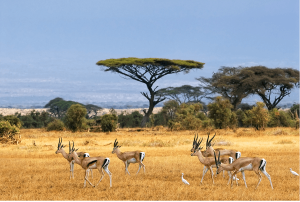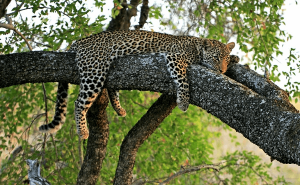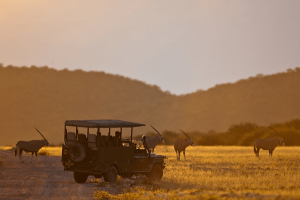All you need to know about ethical safaris
We all love a holiday, what’s the harm in relaxing, experiencing new things and making memories? Well if your holiday includes riding an elephant, selfies with tigers, walking with lions- the list goes on, you could, in fact, be doing more harm than good and contributing to the figure of 110 million people visiting cruel wildlife tourist attractions each year!
According to World Animal Protection “there are at least 550,000 animals suffering at the hands of irresponsible tourist attractions around the world.” Now that doesn’t mean that anything animal-related is off bounds, just the ones that involve captivity, a lack of animal welfare- basically all the nasty stuff. Our unwritten rule is if you can ride, touch, take a photo with, or see a wild animal do tricks, then it should be avoided at ALL costs!
It’s not all doom and gloom, for example, Safari parks that focus on ethical practices are amazing if you’re after a sneak peek at the real lives of some of the most magnificent animals in the world. In the past few years, they have become more and more popular with people growing increasingly aware of the cruelty being inflicted on animals around the world.
What is an ethical safari?
An ethical safari focuses on protecting wildlife, respecting their space and admiring them in their natural habitat. Unlike zoos, there is little financial gain and next to no commercialism…so there’s probably no gift shop (sorry!).

Why are ethical safaris important?
There are so many ‘do nots’ when it comes to responsible travel, that it can just become restricting and annoying; the reality is we’re only human and sometimes we don’t realise the harm caused by what we do on holiday. We all love seeing wildlife and often we can get sucked into believing something is for the good of the animal when in actuality they’re the victim of terrible cruelty. This is why ethical safaris are so important! They give you the chance to see amazing creatures in their natural habitat, guilt-free. Zoos and captivity just give you a distorted view of how an animal lives, but ethical safaris uncover the truth…they’re educational and fun, what more could you want?
How to ensure your safari is ethical
Safaris are on many people’s bucket list, we get it, it’s a once in a lifetime experience. The question is how can you be sure that the one you’ve chosen is ethical? Do they really care about the animals or are they just really good at marketing?
Here are some key tips to help you find your perfect ethical safari:
- If your safari package includes elephant riding, or anything involving direct contact with the animal…avoid, avoid, AVOID!
- Don’t be fooled by the conservation initiatives and charities they claim to be a part of, ask for proof. If they don’t want to give you the information, they’re probably hiding something. There are many amazing conservancies, throughout Kenya and Namibia, where locals look after the conservation of wildlife through sustainable tourism and farming. These places will be happy to discuss the work they do, so be sure to go with one of them!
- Research where the money you’re paying is actually going - a percentage should be going towards conservation, charities, etc if it’s not then it’s a red flag.
- Research the animals living situation, it should show NO signs of captivity. The animals should have complete freedom to roam.
- Look into: how many visitors they allow each day; how many trucks are allowed out at any one time; whether you’re allowed out of the truck to get a closer view; and how close you can get to the animals. Ethical safaris are all about appreciating animals from a distance, at no point should you get out of the truck and disturb the animal’s peace.

Examples of ethical safaris
There are some amazing ethical safari’s that’ll blow your mind. We’ve done the hard part for you and found our top 5!
Duba Plains Camp, Botswana
At the heart of this stunning camp is real love and appreciation for animals! It’s stripped back from any commercial or gimmicky rubbish, just 77,000 acres of perfection. They provide low-impact tourism experiences and even throw in a lodge which is pretty impressive. Their mission is “to find the right formula of conservation, communities and commerce that would make a lasting, sustainable difference to the world's iconic wildlife and wilderness” (need we say more).
Endangered Species Flying Safari, Kenya
If you fancy taking to the skies then how about a scenic air safari plane? Showing you first hand the work done to protect wildlife under threat. Don’t worry, you’ll have your own personal conservationist experts who will answer all those questions we’re sure you’re desperate to ask. And just when you thought it couldn’t get any better...the plane has rotating seats and even panoramic windows…you won’t get that anywhere else!
Hluhluwe Umfolozi Safari, South Africa
How about an incredible safari in Africa’s oldest game reserve? Simply 96,000 hectares of wilderness and wildlife. Now, we know what you might be thinking, a game reserve? Doesn’t that sound a bit like captivity? The reality is that poaching is a real issue especially when it comes to rhinos as regulations aren’t as strict. Here, the park fees contribute directly to conservation and anti-poaching, so you know your money is helping rather than going straight into someone’s pocket.
Kutazama Lodge, Kenya
If you want a truly authentic experience of Africa then this one is for you. Staffed by the local community only, this experience has one of the highest eco-ratings from Tribes Travel. You’ll have the chance to go on drives, walks and picnics in the Shimba Hills National Reserve as well as a visit to the Mwalugange Elephant Sanctuary.
Conservancy Safari’s, Namibia
This safari is all about making your footprint count. This place is so much more than just a safari, it’ll open your eye to extraordinary wildlife and culture. The guides are all internationally recognised working conservationists...they know their stuff, so rest assured you’re in the best possible hands. But the excitement doesn’t end there, they even offer expeditions like yoga, photography and hiking. And when you’re exhausted from your day of adventure, choose whether you stay in a lodge or brave it and try wild camping. This is a once in a lifetime experience like none other, what’s stopping you?

Charities that support/save animals and safaris
Ethical safaris support charities from conservation to anti-poaching and local communities, so be sure to look into where your moneys going before you book. There are a number of local initiatives like the AfriCat Foundation in Nambia and Saruni Rhiono in Kenya.
There are also internationally recognised charities such as World Animal Protection, which aims to end the cruelty of animals…but that’s a mission and they can’t do it without your help! A small donation of £3 a month could support the recovery of rescued bears in one of their sanctuaries, £5 a month could help support essential campaigning work to end the lifelong suffering of elephants in the tourist trade and be brought to an ethical safari or sanctuary to live the life they deserve. The smallest of donations make the world of difference, click here for more information!
Behaving ethically whilst on a safari
Like any experience, there’s do’s and don’ts. We’ve put a little list together for you to save you from getting told off when you’re there (you’re welcome)!
- Throughout your safari, don’t make your guide get closer to the animal and be as quiet as possible, we’re sure you don’t like people in your personal space…well, neither do they!
- Don’t buy souvenirs made from animal products like bone or fur. You’ll only drive demand and we really don’t want any more animals killed for the sake of a memento.
- Keep to the tracks and trails, no off-roading on quad bikes (as exciting as it might be). There’s a time and a place for everything and that’s really NOT the time. You wouldn’t like someone trampling and destroying your home…well, the feeling’s mutual.







